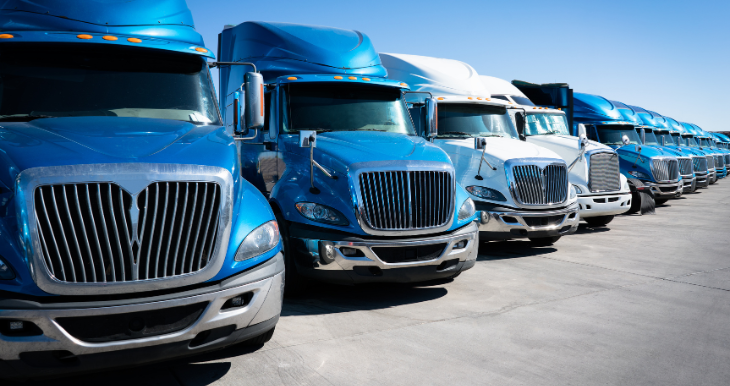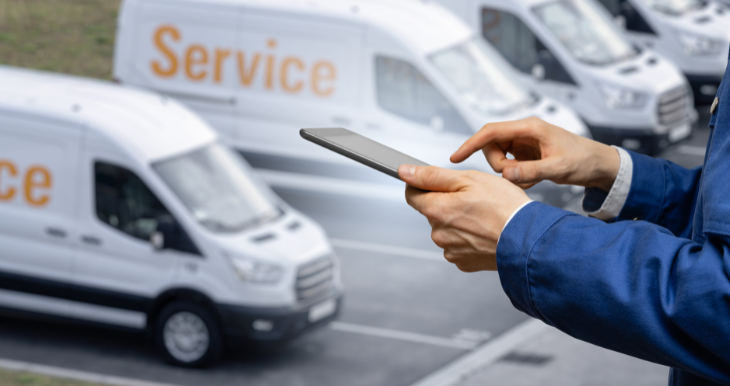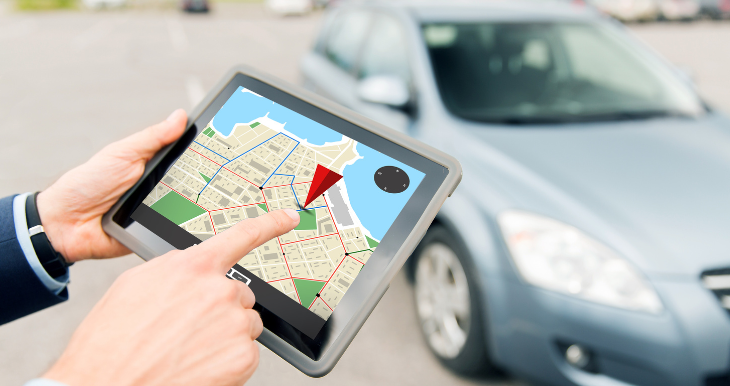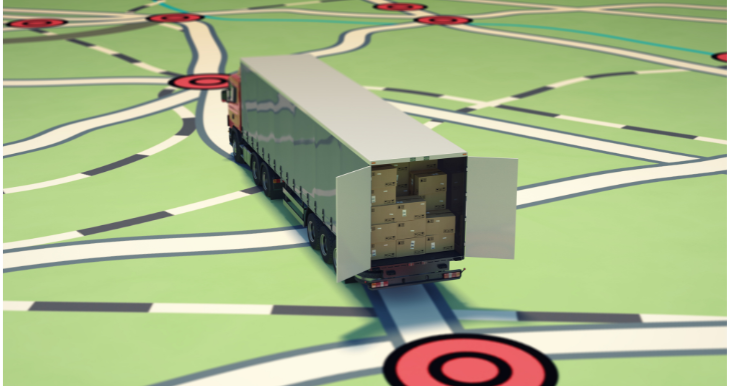Answer these simple questions and we will find you the BEST prices
Which type of solar quotes do you need?
It only takes 30 seconds
100% free with no obligation

Get up to 4 quotes from our selected suppliers by filling in only 1 form

Save money by comparing quotes and choosing the most competitive offer

Our service is 100% free and with no obligation
- Market-Inspector.co.uk
- Vehicle Tracking
Vehicle Tracking: Your Complete 2025 Guide


- Choosing the right tracker for your business ensures the safety of your vehicles and optimises their use. Benefits include reduced fuel costs, improved customer satisfaction through accurate delivery times, and enhanced security.
- Implementing vehicle trackers encourages your employees to adhere to higher driving standards, leading to reduced speeding and better fuel utilisation.
- Some insurers provide lower insurance rates for fleets equipped with tracking devices, offering protection against unjust claims as well. Also, in the event of an emergency involving your drivers, you'll have their precise location, enabling a swift response and assistance.
Selecting the right GPS tracker is pivotal in ensuring efficient tracking of any fleet or vehicle.
Regardless of the type of business industry you are in, the number of vehicles you have, what those vehicles are, or their purpose, your company will benefit from vehicle tracking.
Through fleet tracking, your business can track an employee in a small work vehicle as well as oversee thousands of vehicles and assets all over the world, if you have a logistics company.
This page will guide you through selecting the ideal tracker for your business. Continue reading to discover more insights.
- Describe your needs
- Get free quotes
- Choose the best offer
It only takes 30 seconds

Choosing the best GPS tracker device
Selecting the most appropriate GPS tracking device is a crucial first step as it allows your business to effectively monitor locations in real-time, therefore facilitating the management of vehicle fleets, and safeguarding valuable assets.
The primary categories of GPS tracking devices are active and passive GPS trackers.
- Active GPS trackers: These devices gather and transmit real-time data, including location coordinates, velocity, altitude, and distance covered, among other statistics.
- Passive GPS trackers: These units track the pathways, performance, and conduct of drivers by utilising GPS satellites. Instead of offering immediate data, they record the information on an internal storage, USB drive, or SD card for later retrieval.
Active GPS trackers suit businesses that require real-time data for logistics, emergency services, and fleet management to optimise routes and enhance security. Passive trackers are ideal for budget-sensitive businesses and those needing post-operation analysis or operating with lower security risks, providing a more affordable tracking option without real-time updates.
GPS trackers vary significantly in features and functionality, catering to the diverse needs of businesses.
The choice depends on several factors, including the size of the vehicle and the specific requirements for vehicle tracking.
For smaller vehicles, compact and discreet trackers are ideal, offering essential tracking functionalities without extensive installation. On the other hand, larger fleets might require more complex trackers that provide detailed data on vehicle conditions, driver behaviour, and real-time location tracking.
Key considerations should include your allocated budget for the GPS fleet tracking solution. Also, consider the chosen system's ability to scale and adapt to your business's evolving needs.
Track your vehicles with apps, systems and software
The modern marketplace offers a wide range of apps, systems, and software for vehicle tracking, each boasting different functionalities and features. From basic location tracking to advanced analytics on driver performance and vehicle maintenance, the options are vast.
Vehicle tracking solutions vary widely, catering to both small and large business needs.
High-end options, suited for extensive fleet management, offer features like real-time GPS tracking, route optimization, and predictive maintenance alerts. These options can cost up to several hundred pounds per vehicle for setup and a monthly fee for access to advanced analytics.
Budget-friendly options, ideal for improving delivery efficiency, typically provide real-time location tracking and basic alerts for speeding or idling, with prices starting as low as £20 per month per vehicle.
These variations ensure businesses can find a tracking solution that fits their operational scale and budget, balancing between cost and functionality.
Types of fleet tracking devices
Every fleet tracking system needs a small telematics device fitted in the vehicle. These devices are the distinguishing factor among the various tracking models. There's a variety of devices available, each offering unique features. The top three types include:
Hardwired install devices: These devices are securely connected to the vehicle's system and are designed to be tamper-proof, offering enhanced security. Businesses often select these when the data collected is essential for meeting regulatory requirements or crucial for the company's day-to-day activities. Additionally, these devices can connect to more external devices and sensors, giving deeper insights into how the fleet operates.
Plug-and-play devices: These are easy-to-install devices that you can quickly shift from one vehicle to another within your fleet. Companies opt for these when they don't need the data for legal compliance, have frequent vehicle changes, or use many rental vehicles in their operations.
Mobile app tracking: These systems transform smartphones into tracking tools through apps. They provide basic tracking features and limited connection to vehicle sensors. Businesses often use them for managing tasks like proof of delivery, or for keeping tabs on employee whereabouts when they're not in the vehicle.
What type of vehicle do you need to track?
Businesses often need to keep tabs on various types of vehicles to streamline operations and ensure safety. The most commonly tracked vehicles include:
- Delivery vans and trucks: Essential for logistics and delivery companies to monitor the timely delivery of goods.
- Company cars: Used by employees for business purposes, ensuring they're used efficiently and for authorised tasks only.
- Construction and heavy machinery: To safeguard expensive equipment and optimise usage on job sites.
- Public transport vehicles: Such as buses and trains, to maintain schedules and monitor driver compliance.
- Ride-hailing services: Essential for optimising route efficiency, ensuring driver and passenger safety, and enhancing customer satisfaction with real-time updates.
Monitoring your vehicles offers numerous advantages, regardless of whether you operate in public transportation or offer private taxi services. Using technology can significantly improve your processes and decrease expenses. We have highlighted some key benefits below.
- Improved efficiency: Optimise routes and reduce fuel consumption, which can lead to lower costs.
- Enhanced safety: Monitor driver behaviour and ensure compliance with driving hours regulations.
- Theft prevention: Quickly locate and recover stolen vehicles, reducing potential losses.
- Better customer service: Provide accurate delivery times and updates to customers.
- Improved vehicle maintenance: Enable proactive vehicle maintenance by monitoring usage and identifying issues early, ensuring vehicles are serviced on time.
Failing to track your vehicles can lead to several disadvantages, such as:
- Increased costs: Without efficient route planning, fuel costs and maintenance expenses can skyrocket.
- Security risks: An unmonitored vehicle can be a prime target for theft.
- Compliance issues: Risk of non-compliance with legal regulations regarding driving hours and vehicle usage.
- Customer dissatisfaction: The inability to provide real-time updates may lead to unhappy customers.
Legal requirements for vehicle tracking
Knowing when and how to track your business vehicles enhances operational efficiency, ensures legal compliance, and improves overall service quality.
Commercial vehicles over a certain weight must have tachographs installed to record driving times, breaks, and rest periods to comply with regulations.
On the other hand, public transport vehicles like buses and trains may need to be tracked for safety and scheduling compliance.
- Describe your needs
- Get free quotes
- Choose the best offer
It only takes 30 seconds

Fleet tracking
Fleet tracking is a pivotal strategy for businesses managing vehicles, including taxis, vans, and trucks.
Initially, the right trackers must be chosen based on specific needs, such as GPS devices for real-time location data or OBD trackers for vehicle diagnostics.
Installation of fleet tracking ranges from straightforward DIY to professional setups, with the device's placement crucial for optimal performance. Pairing these trackers with dedicated apps or software enables detailed vehicle monitoring and management.
The fleet tracking system tailors to diverse operational requirements, offering features like live tracking, route optimization, geofencing, and maintenance alerts.
Businesses can customise alerts and reports, enhancing efficiency, security, and compliance with regulatory standards. Integration with existing business software further streamlines operations, providing valuable insights into fleet usage and performance.
Advantages of utilising fleet management solutions
Investing in GPS fleet management solutions brings a multitude of advantages for businesses. Fleet managers can access deep insights into driver performance, regulatory adherence, vehicle upkeep, and task coordination.
Such systems can enhance business processes in several key areas:
- Foster accountability among staff: By establishing clear performance indicators, exceptional employees can be acknowledged, while those needing further development are identified. This creates a workplace where every team member feels responsible for their contributions.
- Reduce ongoing operational expenditures: Although the initial setup cost of GPS tracking solutions might deter some, these systems quickly prove their worth by saving money in the long run. Through enhanced efficiency and optimal asset usage, businesses can cut operational costs.
- Enhance security through immediate unauthorised movement alerts, and improve operational efficiency with fuel savings and optimised routes.
- Ensure compliance with legal standards: GPS fleet management software can make adhering to regulations less difficult through digital processes and automation.
Moreover, to maintain direct contact with their fleet, numerous companies are integrating GPS tracking. Many of these systems come with mobile applications that link drivers with coordinators, facilitating efficient assignment of tasks and communication.
Establishing dedicated communication channels for instant information sharing ensures critical updates such as alterations in routes, task statuses, and delivery confirmations are consistently logged and accessible.

Car tracking
Car tracking is essential for monitoring fleet location, enhancing security, and improving efficiency. Car monitoring provides insights into a single vehicle's whereabouts and behaviour, useful for overseeing individual assets or employee use.
Fleet tracking, in contrast, offers a comprehensive view of all company vehicles, enabling strategic decisions to enhance efficiency, productivity, and operational cost savings.
The process of car tracking involves:
- Selecting the right tracker: Identify your needs, such as real-time tracking or theft protection. Options include GPS trackers for location data, VHF trackers for theft recovery, and OBD trackers for vehicle diagnostics. Consider subscription services for access to tracking software.
- Installing the tracker: Choose between professional installation or DIY, depending on the tracker type. Install the tracker in a concealed location with a clear sky view for optimal GPS signal reception.
- Pairing with an app or system: Set up the tracking system by creating an account and configuring settings. Familiarise yourself with features like live tracking, geofence alerts, and speed monitoring. Businesses should integrate the tracker with operational software for route optimization and maintenance management.
Advantages of utilising car tracking solutions
Car tracking solutions provide key benefits by offering insights into vehicle use, driving behaviour, and maintenance, improving route efficiency, safety, and regulatory compliance for businesses.
The benefits for businesses that use a car tracker are listed below.
- Enhanced security: Quick alerts on unauthorised movements help in theft prevention and recovery.
- Operational efficiency: Real-time insights into vehicle usage and route optimization lead to fuel savings and better customer service.
- Maintenance management: Alerts for regular maintenance prevent breakdowns, extending vehicle life.
- Compliance: Automated reporting aids in regulatory compliance and safety improvement.
Also, selecting and utilising a suitable car tracking system can significantly benefit asset protection and operational optimization for businesses.

Van tracking
Van tracking is essential for businesses that rely on larger vehicles for delivery or transportation services.
Similar to car tracking, the process involves selecting a suitable tracker, installing it, and using the right software - based on your business needs - or system for monitoring.
Using a van tracker can boost business efficiency, customer satisfaction, and safety while reducing fuel costs. It enables effective fleet management, and route optimisation, and identifies inefficiencies, making it essential for improving operational performance.
Truck tracking
Truck tracking is crucial for businesses involved in long-haul transport or large-scale deliveries.
Van tracking focuses on route optimisation for timely deliveries, while truck tracking prioritises fuel management, regulatory compliance, and maintenance for long-distance efficiency. Implementing a truck tracking system is essential for businesses within this industry.
Here's how you can select and integrate the perfect GPS truck tracker for your organisation.
Selecting and installing the right tracker: Choose a GPS tracker tailored to your fleet's needs, focusing on devices that offer comprehensive real-time data and robust tracking features. Installation varies from simple plug-and-play to more complex setups needing professional installation. Proper placement ensures discreet yet effective tracking.
Pairing with the right app or software: Integrate the tracker with an app or software that provides real-time location, route history, and driver behaviour analytics. This allows for better route management, scheduling accuracy, and operational transparency.
Advantages of using truck tracking solutions
Truck tracking solutions enhance business operations by providing detailed information on vehicle location, driver performance, and maintenance needs, ensuring safer, more efficient routes and compliance with transport regulations.
These systems can improve business operations across multiple aspects:
- Efficiency and cost reduction: Optimise routes to significantly cut fuel costs, which constitute a major part of operating expenses.
- Improved customer service: Real-time updates and flexible scheduling enhance delivery reliability, boosting customer satisfaction.
- Driver monitoring: Analyse driving patterns to improve safety and reduce maintenance costs.
- Theft recovery: Enable fast recovery of stolen vehicles with precise location tracking.
- Compliance and cost avoidance: Avoid regulatory fines by accurately logging vehicle use and driver hours.

Small commercial vehicle tracking
For businesses utilising motorcycles or bicycles, selecting a compact, durable tracker with real-time tracking and geofencing capabilities is crucial.
Installation involves securing the tracker in a discreet location on the vehicle and ensuring it's either fully charged or connected to the vehicle's power source. Pairing the device with a compatible app or software enables features like journey history and alerts.
Small commercial vehicle tracking can bring many benefits to your business. These include enhanced efficiency through optimal route planning, improved security with theft alerts, better fleet management through detailed analytics, and increased customer satisfaction with accurate ETAs, all contributing to significant cost savings.
The process and benefits are similar to those of larger vehicles, with an added emphasis on the compactness and discretion of the tracking device.
Laws, rights and regulations for vehicle tracking
We will cover the general laws and regulations regarding the tracking of business vehicles, employee rights, and the benefits of vehicle tracking in terms of insurance.
Employers must ensure their tracking practices comply with privacy laws and regulations, providing transparency and securing consent from employees where necessary.
Businesses must comply with the General Data Protection Regulation (GDPR) when using GPS technology for tracking. This means that employees must be informed about and consent to the tracking of their vehicles.
Also, tracking should only occur during working hours unless the vehicle is used for both work and private purposes, in which case privacy features must be enabled outside of work hours.
Certain vehicles, such as heavy goods vehicles (HGVs), are subject to additional regulations. For instance, HGVs must be equipped with tachographs to record drivers' hours, ensuring compliance with limits designed to prevent fatigue.
Vehicle tracking laws
Regarding tracking laws, you will need to ensure that GPS device data is solely used for managing your business operations. It's crucial not to use this data to monitor employee actions.
For instance, if you operate a courier service with thirty vans, analysing your fleet's data to pinpoint the most effective delivery routes or ideal times to bypass traffic jams is allowed. However, employing this data to discipline an employee for completing fewer deliveries is off-limits.
Remember that installing a tracking device without the driver's knowledge and consent is against the law, except for theft prevention purposes.
Insurance
Installing a GPS tracker in vehicles can result in reduced car insurance premiums. Therefore, reducing your overall business costs.
Insurance companies typically consider vehicles equipped with GPS tracking systems as less risky, attributing this to improved security features and the increased likelihood of swift vehicle recovery in case of theft.
How much does vehicle tracking cost?
For a basic GPS tracking system, which typically includes essential features such as location tracking and historical route data, businesses can expect initial costs per vehicle to fall within the range of £150 to £300. This initial investment covers the hardware required for tracking, as well as the installation process.
However, for businesses seeking more advanced functionalities such as real-time tracking, driver behaviour analysis, and comprehensive reporting capabilities, the costs can escalate to £500 or more per vehicle. These advanced systems often come with additional hardware components and require more intricate installation procedures.
In addition to the initial investment, businesses should also budget for ongoing subscription fees for these tracking services. Subscription fees typically range from £10 to £30 per vehicle per month, depending on the level of service and features included. These fees cover the cost of data transmission, software updates, customer support, and access to advanced features.
It's important to note that the cost of vehicle tracking systems can vary significantly depending on several factors, including the type of technology used - for example, GPS, cellular, satellite - the number of vehicles being tracked, and the specific features and functionalities required by the business.
Therefore, you should carefully assess your business’s tracking needs and budget before selecting a tracking solution.
With numerous providers presenting various features and pricing options, discovering the ideal service that aligns with your business objectives and budget is more straightforward than ever. Take action now by seeking personalised quotes, and propel your fleet towards greater efficiency and cost reduction.
- Describe your needs
- Get free quotes
- Choose the best offer
It only takes 30 seconds

FAQ
For a basic GPS tracking system, initial costs per vehicle range from £150 to £300, which includes hardware and installation. More advanced systems with features like real-time tracking and driver behaviour analysis can escalate to £500 or more per vehicle.
Subscription fees for these services can range from £10 to £30 per vehicle per month, depending on the level of service.
The cost of vehicle tracking systems varies significantly depending on several factors, including the type of technology, the number of vehicles, and the desired features.
Monitoring a fleet involves using GPS trackers and specialised software to track location, monitor driver behaviour, and manage maintenance. Real-time data and analytics play a crucial role in optimising fleet operations.
The best GPS tracker for vehicles depends on the specific needs of the business. Entry-level systems are suitable for one or several vehicles, however, if you have larger fleets, more complex systems would be suitable.
Having a GPS tracker installed in vehicles leads to lower car insurance premiums. Insurers often view tracked vehicles as a lower risk due to the enhanced security and the ability to efficiently recover stolen vehicles.

Nicole Bea Kerr is a content writer for Market Inspector, leveraging her experience in B2B journalism and editing. She is interested in bringing more awareness to sustainability and helping businesses make informed choices through insightful narratives.
We strive to connect our customers with the right product and supplier. Would you like to be part of Market Inspector?

